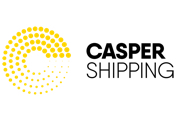20th, April 2023
Maritime goes digital
Have you ever wondered what effect the digital era has had on traditional job roles? Well I had the opportunity to sit down with Casper Group’s Nikki Sayer and Alan Appleyard to find out how digitalisation has impacted the maritime sector.
Casper Group is the UK’s leading independent maritime services company, providing end-to-end shipping solutions across Europe. From customs to chartering and logistics to marine, our services are delivered with a professional, personal and practical approach that takes care of the complex and goes the extra mile to deliver.
Industry Insight, News and PR
Q: How did Casper Customs use digitalisation to prepare for BREXIT?
A: Casper Customs used digitalisation to prepare for BREXIT by investing in their systems and technology to automate the declaration process. They worked with reliable software suppliers to connect their systems and processes using an application processing interface, allowing for quick and efficient custom clearance documentation processing.
Q: How did Casper Customs train people during the pandemic with regards to digitalisation?
A: Casper Customs trained people during the pandemic by creating a special training plan that was successful, even though they had to take social distancing into account. They did the training remotely, in separate offices, with online meetings and screen sharing to ensure people could learn how to use digitalisation tools such as an application processing interface.
Q: What is Casper Digital, and how is it helping Casper Customs further digitalise its processes?
A: Casper Digital is a new and expanding technology platform that Casper Customs introduced to further digitalise its processes. They are using the latest and most popular architecture for internal software development and a collaborative approach to customs digitalisation and automation. This has helped them develop innovative solutions that are specifically designed for a particular industry niche and created by people who have industry expertise.
Q: How has digitalisation impacted Casper Customs’ efficiency in processing custom clearance documentation?
A: Digitalisation has greatly impacted Casper Customs’ efficiency in processing custom clearance documentation by allowing for quicker and more efficient processing times. With the use of an application processing interface, they are able to provide consistent custom clearance documentation within one hour.
Q: How has digitalisation changed the role of customs operators at Casper Customs?
A: Digitalisation has changed the role of customs operators at Casper Customs by requiring them to become more like data scientists and analysts instead of just data entry clerks. By embracing digitalisation and technology, customs operators are now able to collaborate more with the digital team to increase productivity and efficiency, leading to better customer service.







